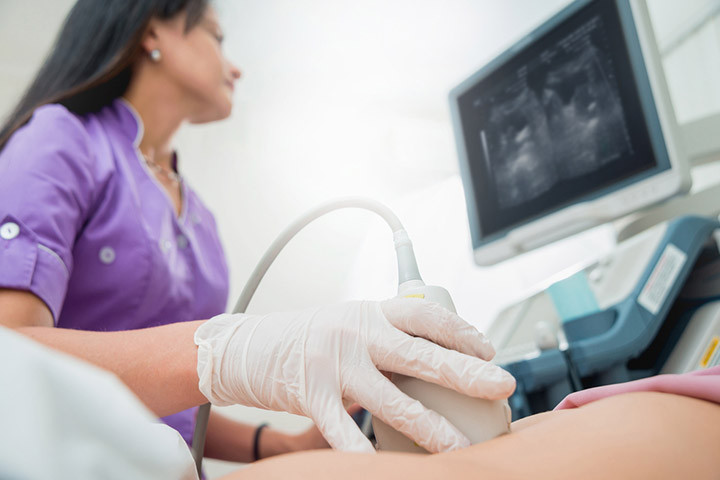
The firsts of anything are cherished forever. Your first day at school, the first day in college, and let’s not forget your first love! In the same way, seeing the first evidence of your baby on ultrasounds has “special” written all over it. Yes, a positive pregnancy test, mood swings, and morning sickness are proof enough: still, your first ultrasound — around 12 weeks into your pregnancy — provides strong evidence that you’re growing a baby inside you.
Week 12 of your pregnancy marks the end of your first trimester, which is when your baby’s major body systems and organs are fully developed. In most cases, the 12-week ultrasound could be the first time you see your baby (1).
Like other milestones in life, seeing your baby for the first time can be quite an exciting incident in your life. You might be full of smiles or even shedding a few joyful tears at first sight of your adorable one. Whatever be your emotion, it’s okay to express it. It’s your moment, and this is truly one-of-a-kind!
Your 12-week ultrasound drops major hints and information about various concerns or issues surrounding your baby. If you’re curious to learn more about what it could be, here are a few things that you should expect from a 12-week ultrasound:
What Is An Ultrasound?
An ultrasound, also known as sonography, is an imaging technique that uses high-frequency sound waves to capture images of the insides of your body. When an ultrasound examination takes place, the energy of the sound waves strikes the fluids, tissues, or bones and echoes back to produce a reading that can help read internal conditions (2).
Why Do You Have A Scan In The 12th Week Of Your Pregnancy?
Ultrasound scans help reveal a lot about your unborn baby. The 12-week ultrasound helps your medical provider understand if you’re getting sufficient rest and nutrition as your pregnancy progresses and if your baby is growing healthily. Along with this, here is the information a 12-week ultrasound can provide you with (3):
- Confirmation of your pregnancy.
- The approximate due date of your delivery.
- The number of babies you may expect.
- Whether the baby is carrying genetic disorders or other anomalies like Down syndrome.
- To check the size of your baby.
- To gauge the position of your baby.
- To capture the baby’s heart rate.
- To determine if you’d have a cesarean or normal birth by observing the position of the placenta.
In olden times, doctors wouldn’t recommend an ultrasound in the first trimester, that is, the first 12 weeks of pregnancy. With technological advancements making ultrasounds safer, doctors may recommend them as early as the 6th or 7th week of pregnancy. So, the 12-week ultrasound may not really be the first time you might see your baby on a screen. However, by the 12th week, your baby has grown sufficiently enough for your doctor to check and conclude useful information they may not have known before (4).
What Are The Drawbacks Of Having A 12-Week Ultrasound?
No evidence proves that babies scanned during the 12th week of pregnancy are negatively impacted in any way (5). However, it would be crucial to bear in mind that modern ultrasounds today have a higher frequency than the traditional ones. With insufficient evidence to entirely rule out the possibility of adverse effects during a 12-week ultrasound scan, it is good to exercise some care while opting for 3D and 4D ultrasound scans (6).
The American College of Obstetrics and Gynecologists (ACOG) recommends having only a medically required number of ultrasounds which is generally two: the 12-week ultrasound and the 20-week ultrasound (anatomy scan) (7). Only when you have a complicated pregnancy at any point in your pregnancy, your doctor may request more ultrasounds.
What Should You Expect During The 12-Week Ultrasound?
The 12-week ultrasound is generally an external scan (examination through your abdomen) (8). In some cases, when the abdominal ultrasound does not produce clear images, an internal scan through your nether region may be necessary (9). Also, a full bladder is essential for the sound waves to travel better and capture images accurately. So, you may be asked to drink 2-3 glasses of water before you go into the check-up room (10).
During an ultrasound, your healthcare provider applies an ultrasound gel on the surface of your belly, through which the sound waves travel into your body. They’ll take images of the uterus and a video recording for a detailed analysis by a radiologist. It is usually a pain-free procedure, but there could be a certain amount of discomfort experienced with frequent changes in your position during the session.
Expectant parents are usually excited, anxious, and thrilled about the first 12-week ultrasound. It helps you bond differently with your unborn child and makes you build hopes and dreams of the day when they’ll finally be in your arms. Remember that prenatal care is critical in your journey through pregnancy. With all the information at hand, you’re equipped to take better care of your baby and you and heed the necessary advice of your doctor. Did you have a 12-week ultrasound already? How was your experience? Do share your stories with us in the comments section below!















